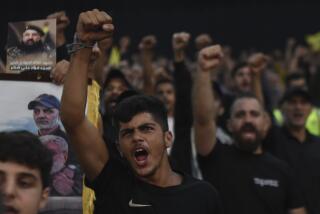Beheading for Sake of Fear, Not Islam
- Share via
LONDON — Daniel Pearl, Nicholas Berg, Paul M. Johnson Jr. and now a threat against a South Korean: Militants in the Middle East and South Asia have adopted beheading, vaguely invoking religious justifications or Arab tradition for the method of killing. Yet most Muslims would consider that a gross misinterpretation of their religion.
There is nothing particularly Islamic about decapitation, no exhortation in the Koran to carry out beheadings, and no religious prescription for the killing of innocents in any form, religious scholars and academics say.
Instead, they see a more sinister 21st century motive behind the atrocities -- the desire to gain maximum attention and engender maximum horror to further political aims.
The images, carried on videotape and made available for rapid viewing on the Internet and on television networks that broadcast them, have appalled and terrified people around the world -- precisely the aim of the militants, said Michael Izady, a professor of history at Pace University in New York.
“Their chief motive is a reaction of horror and shock,” agreed Asma Afsaruddin, an associate professor of Arabic and Islamic studies at the University of Notre Dame.
While she acknowledged that the militants might say they are acting in accord with their religion, Afsaruddin said such claims should not simply be accepted.
“Just because a certain group claims it is behaving in accordance with Islamic conduct, that does not mean we should believe that,” she said. “There is absolutely no religious imperative for this. Clearly, what is behind it is vindictiveness and a desire to get as much attention as they can.”
Al Qaeda has embraced such tactics because it sees itself in a global struggle against the West, and the beheadings are a way of warning its foes that it must be taken into account, said Richard Dekmejian, professor of political science at USC.
Since ancient times, decapitation has been widely used for executions, not only in the Arab world, but elsewhere -- for instance, in Japan and in some European countries up to the 20th century.
Saudi Arabia, despite much criticism from Amnesty International and other human rights groups, still beheads scores of people in public each year for crimes including murder, rape, armed robbery and drug trafficking.
Izady said there was a clear distinction between the swift execution of people judged guilty of crimes, and the slow beheading of hostages by terrorists -- a method, he said, which had been used in the past only in the most heinous criminal cases. He expects the tactic to be copied by others.
“It will be an epidemic, unfortunately, until it loses its special effect,” he said.
Dipak Gupta, a research associate at the Fred J. Hansen Institute for World Peace at San Diego State University, pointed to the strong symbolism of the sword in Mideast mythology and history: the sword of the prophet, the sword of the prince, Saddam Hussein’s crossed-sword monument in Baghdad.
For the terrorists, the use of the sword “would symbolize justice done to a deserving miscreant,” he said. “To shoot a victim or to hang him will not have the same symbolic effect.”
More to Read
Sign up for Essential California
The most important California stories and recommendations in your inbox every morning.
You may occasionally receive promotional content from the Los Angeles Times.













